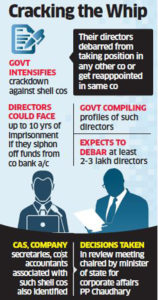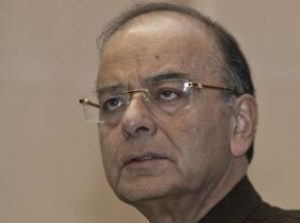 The finance ministry has advised all banks to take immediate steps to restrict transactions in bank accounts of more than 2.09 lakh companies, whose names have been struck off the Register of Companies.
The finance ministry has advised all banks to take immediate steps to restrict transactions in bank accounts of more than 2.09 lakh companies, whose names have been struck off the Register of Companies.
Banks have also been advised to step up due diligence while dealing with all firms in general and been alerted that even if a firm is ‘active’ in the corporate affairs ministry database, it should be seen with ‘suspicion’ if it has failed to file statements or returns.
‘Not compliant’
“…Prima facie, the company is not complying with its mandatory statutory obligations to file this vital information for availability to its stakeholders,” the finance ministry has reasoned.
On July 1, Prime Minister Narendra Modi had first revealed the government’s decision to cancel the registrations of one lakh companies that had suspicious and questionable operations, identified on the basis of data mined from the deposit of bank notes following last November’s demonetisation of Rs.500 and Rs.1,000 notes.
The PM had promised more action would follow on two lakh similar firms and 38,000 shell companies. Tuesday’s statement reveals that progress has been made in scrapping another 1,09,032 firms under the Companies Act since then.
‘Directors barred’
“The existing directors and authorised signatories of such struck-off companies will now become ex-directors or ex-authorised signatories. These individuals will therefore not be able to operate bank accounts of such companies till such companies are legally restored under Section 252 of the Companies Act by an order of the National Company Law Tribunal,” the ministry said, disclosing ‘stepped up decisive action’ against errant companies.
“Since such ‘struck off’ companies have ceased to exist, action has been initiated to restrict the operation of [their] bank accounts. The Department of Financial Services has, through the Indian Banks Association, advised all banks … [to] take immediate steps to put restrictions on bank accounts of such struck-off companies,” the ministry said, adding that the list of firms had been put up on the corporate affairs ministry’s website.
In addition, the statement said that banks had been advised to go in for ‘enhanced diligence while dealing with companies in general.’
“A company… even having an active status on the website of the Ministry of Corporate Affairs but defaulting in filing of its due financial statement/s or annual return/s in particular of charges on its assets on the secured loan should be seen with suspicion…” the ministry has told banks.
Source: The Hindu






